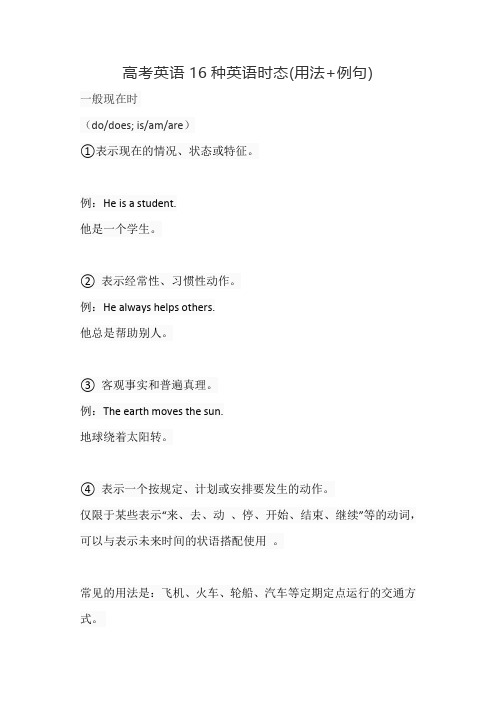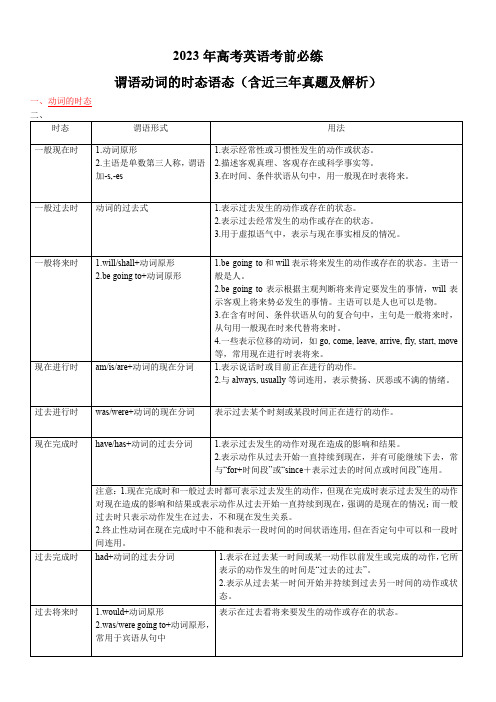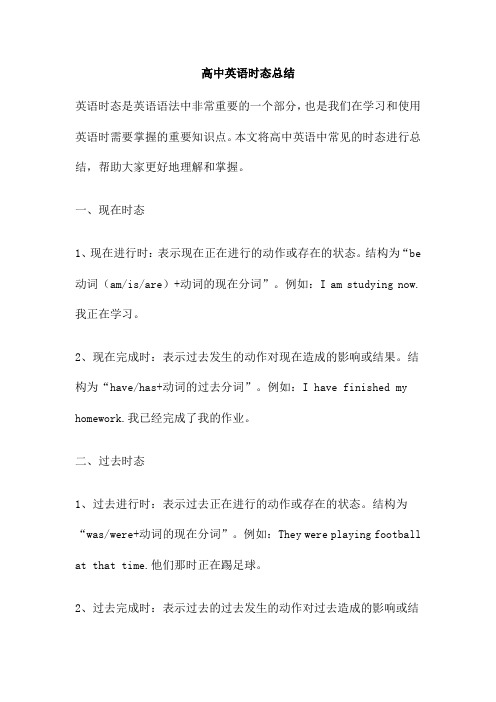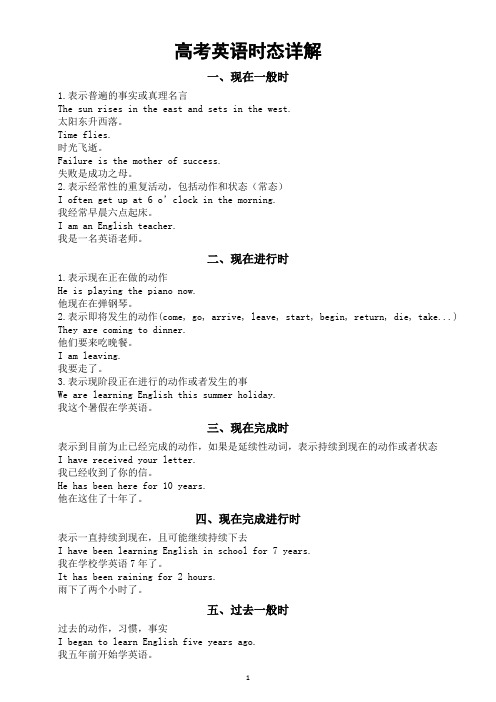高考英语动词的时态详解
高考英语16种英语时态

高考英语16种英语时态(用法+例句)一般现在时(do/does; is/am/are)①表示现在的情况、状态或特征。
例:He is a student.他是一个学生。
② 表示经常性、习惯性动作。
例:He always helps others.他总是帮助别人。
③ 客观事实和普遍真理。
例:The earth moves the sun.地球绕着太阳转。
④ 表示一个按规定、计划或安排要发生的动作。
仅限于某些表示“来、去、动、停、开始、结束、继续”等的动词,可以与表示未来时间的状语搭配使用。
常见的用法是:飞机、火车、轮船、汽车等定期定点运行的交通方式。
例:The next train leaves at 3 o'clock this afternoon.下一趟火车今天下午3点开车。
⑤ 在时间、条件和让步状语从句中经常用一般现在(有时也用现在完成时)表示将来的事情。
(即:主将从现原则)例:I will call you as soon as I arrive at the airport.我一到机场就会给你打电话。
When you have finished the report, I will have waited for about 3 hours.等你完成这份报告的时候,我就已经等了将近3个小时了。
2 现在进行时(am/is/are doing)①表示此时此刻正在发生的事情。
例:He is listning to the music now.他现在正在听音乐。
② 表示目前一段时间内一直在做的事情,但不一定此时此刻正在做。
例:I am studying computer this term.这个学期我一直在学习计算机。
③现在进行时可以表示将来的含义。
a. 瞬时动词的进行一定表将来。
例:I am leaving.我要离开了。
b. 持续动词的进行只有有将来的时间状语或有将来语境中才表将来。
例:I am travelling next month.下个月我要去旅行。
高考英语十大时态

高考英语十大时态在高考英语中,时态是一个重要的语法知识点,掌握好时态对于理解和表达英语至关重要。
下面我们就来详细了解一下高考英语中的十大时态。
一、一般现在时一般现在时表示经常发生的动作、存在的状态或习惯性的动作。
它常与 always, usually, often, sometimes, never 等频度副词连用。
例如:I get up at six every morning(我每天早上六点起床。
)The earth moves around the sun(地球绕着太阳转。
)在一般现在时中,当主语是第三人称单数时,动词要发生相应的变化,一般是在动词词尾加 s 或 es。
二、一般过去时一般过去时表示过去某个时间发生的动作或存在的状态。
比如:I played basketball yesterday(我昨天打篮球了。
)He was a teacher ten years ago(十年前他是一名老师。
)与一般过去时连用的时间状语有:yesterday, last week, last month, last year 等。
三、一般将来时一般将来时表示将来要发生的动作或存在的状态。
我们可以用“will +动词原形”或者“be going to +动词原形”来表达。
例如:I will go to Beijing next week(我下周要去北京。
)She is going to have a party this weekend(她这个周末要举办一个聚会。
)四、现在进行时现在进行时表示现在正在进行的动作。
其构成是“be +动词的现在分词”。
Look! They are playing football(看!他们正在踢足球。
)现在进行时有时也可以表示即将发生的动作,通常与 come, go, leave 等动词连用。
五、过去进行时过去进行时表示过去某个时刻正在进行的动作。
It was raining heavily at eight o'clock yesterday morning(昨天早上八点雨下得很大。
2023年高考英语考前必练 谓语动词的时态语态(含近三年真题及解析)

2023年高考英语考前必练谓语动词的时态语态(含近三年真题及解析)一、动词的时态特殊用法1.在时间、条件和让步状语从句中,如果主句谓语动词是一般将来时,从句用一般现在时。
如:We’ll have a picnic if it is fine next Sunday.如果下个星期日天气晴朗,我们将去野餐。
I’ll call you as soon as I get to Beijing tomorrow.我明天一到北京就给你打电话。
2.某些表示起始、往返、出发、到达之意的动词,可用一般现在时表示按规定、计划或安排将要发生的动作(此时一般都有一个表示未来时间的状语)。
这类动词有:begin, come, go, leave, start, arrive, end, stop, open, close等。
如:The meeting begins at 2:00 p.m. tomorrow.这个会议明天下午2点开始。
The next train leaves at 7 o’clock this evening.下一列火车将在今晚7点离开。
3.现在进行时与always, continually, forever等副词连用,表示反复出现或习惯性的动作,这种用法往往表达说话人的某种感情,如赞扬、遗憾、讨厌或不满等。
如:The rich woman is always laughing at the poor.这个有钱的夫人总是嘲笑穷人。
4.现在完成时中表示短暂动作的动词不能与for, since等引导的时间状语连用。
如与一段时间连用,要把瞬间动词转化为意思相近的延续性动词。
常见的变化有:特殊用法1.open,lock,write,read,sell,clean,wash,cut,drive等词作不及物动词时,它们的主语为物,可用主动语态表示被动意义。
如:This kind of pen writes very smoothly.这种钢笔写起来很流畅。
高考英语动词的时态和语态语法知识点与技巧方法

高考英语动词的时态和语态语法知识点与技巧方法说到时态语态的题目,好多同学苦恼不已,看到一道题,不知道如何去分析,看不懂选项之间的区别,找不到做题的方法和思路。
时态语态具体都有哪些知识点呢?小编整理了相关资料,希望能帮助到您。
一般现在时一般过去时一般将来时过去将来时现在进行时主动do/doesdidwill/shall dowould/should doam/is/are doing被动am/is/are donewas/were donewill/shall be donewould/should be doneam/is/are being done过去进行时将来进行时现在完成时现在完成进行时过去完成时主动was/were doingwill/shall be doinghave/has donehave/has been doinghad done被动was/were being done----------have/has been done----------had been done一、一般现在时1、表示经常发生的习惯性的、现在反复出现的动作或状态,常用的时间状语有:always,usually,seldom, sometimes, every day, now and then, once a week等。
2、表示眼下或目前等现在时间所发生的动作或存在的状态,这种状态带有一定的持续性。
3、表示客观事实或普遍真理。
4、书报的标题,故事的叙述,小说、戏剧、电影等情节介绍,图片的说明等。
5、时间表、时刻表、日程表、节目单、课程表等按规定将要发生的动作,只限于go, arrive, leave, start, stay, return, begin, come等动词。
6、在时间、条件、方式、让步状语从句中,表示将来的动作。
注意:一般现在时可以用于定语从句或宾语从句中表示将来。
7、用在某些表达中,表示现在正在发生的动作或存在的状态。
高中英语时态总结

高中英语时态总结英语时态是英语语法中非常重要的一个部分,也是我们在学习和使用英语时需要掌握的重要知识点。
本文将高中英语中常见的时态进行总结,帮助大家更好地理解和掌握。
一、现在时态1、现在进行时:表示现在正在进行的动作或存在的状态。
结构为“be 动词(am/is/are)+动词的现在分词”。
例如:I am studying now.我正在学习。
2、现在完成时:表示过去发生的动作对现在造成的影响或结果。
结构为“have/has+动词的过去分词”。
例如:I have finished my homework.我已经完成了我的作业。
二、过去时态1、过去进行时:表示过去正在进行的动作或存在的状态。
结构为“was/were+动词的现在分词”。
例如:They were playing football at that time.他们那时正在踢足球。
2、过去完成时:表示过去的过去发生的动作对过去造成的影响或结果。
结构为“had+动词的过去分词”。
例如:They had finished their work before we arrived.他们在我们到达之前已经完成了他们的工作。
三、将来时态1、将来进行时:表示将来某个时间正在进行的动作或存在的状态。
结构为“will+be动词+动词的现在分词”。
例如:I will be studying at 9 o’clock tomorrow.我明天9点将会在学习。
2、将来完成时:表示将来某个时间已经完成的动作或达到的状态。
结构为“will+have+动词的过去分词”。
例如:I will have finished my homework by 10 o’clock tonight.我将在今晚10点之前完成我的作业。
以上是高中英语中常见的时态总结,希望能够帮助大家更好地理解和掌握英语时态。
需要注意的是,不同的时态有着不同的用法和结构,大家在使用时需要根据语境选择合适的时态。
高中英语高考复习时态详细讲解(共16类)

高考英语时态详解一、现在一般时1.表示普遍的事实或真理名言The sun rises in the east and sets in the west.太阳东升西落。
Time flies.时光飞逝。
Failure is the mother of success.失败是成功之母。
2.表示经常性的重复活动,包括动作和状态(常态)I often get up at 6 o’clock in the morning.我经常早晨六点起床。
I am an English teacher.我是一名英语老师。
二、现在进行时1.表示现在正在做的动作He is playing the piano now.他现在在弹钢琴。
2.表示即将发生的动作(come, go, arrive, leave, start, begin, return, die, take...) They are coming to dinner.他们要来吃晚餐。
I am leaving.我要走了。
3.表示现阶段正在进行的动作或者发生的事We are learning English this summer holiday.我这个暑假在学英语。
三、现在完成时表示到目前为止已经完成的动作,如果是延续性动词,表示持续到现在的动作或者状态I have received your letter.我已经收到了你的信。
He has been here for 10 years.他在这住了十年了。
四、现在完成进行时表示一直持续到现在,且可能继续持续下去I have been learning English in school for 7 years.我在学校学英语7年了。
It has been raining for 2 hours.雨下了两个小时了。
五、过去一般时过去的动作,习惯,事实I began to learn English five years ago.我五年前开始学英语。
完整版高考英语动词时态和语态讲解
时态语态〔一〕一般在表示:1.在的常性、性作 eg:IreadEnglisheverymorning.2.客真理、普遍公立、科学事eg:Thesunrisesintheeast.3.有的趣、好或能力eg:Helikesplayingfootball.4.存的性、特征或状eg:Thesituationisencouraging.5.介故事情、新eg:Workersfacetoughtimesabroad.6.按刻表或按定划、安排将要放生的作〔常如:come,go,leave,arrive,begin,start,takeoff,return,stop,open,close等〕eg:Thetrainleavesat4:30p.m.注意:here,there,now,then等开的倒装句要用一般在代替在行。
如:Look!Herecomesthebus.一般去表示:1.去常性、性的作或状eg:Heoftencriedwhenhewasaboy.2.去某的状或作eg:Iwenttothebankjustnow.3.用于Ididn’tknow⋯或Iforgot⋯,表示不知道或不得,但在道或得的事情。
eg:Ididn’tknowyouwerehere.Sorry,Iforgottobringmybook.注意:表示去常生的作,也可以用“usedtodo⋯〞和“woulddo〞一般将来表示: 1.在看来以后要生的作或存在的状eg:Tomwillcomenextweek.2.事物的固有属性或必然eg:Oilwillfloatinwater. Fishwilldiewithoutwater.3.将来某个作的安排、划eg:HeisgoingtospeakonTVthisevening.注意:将来常表达形式:will/shalldo;begoingtodo;betodo;beabouttodo 〔此形式不能与状用〕在行表示: 1.此此刻正在生的作eg:I’mstudyingEnglishnow.2.段正在生的作eg:Wearebuildingoursocialism.3.情况的性eg:Idon’treallyworkhere.Iamjusthelpinguntilthesecretaryarrives.4.与always,forever,constantly,continually 用,表示参上或等感情色彩,但并非作正在行eg:Heisalwayshelpingothers. Sheisalwaysforgettingsomething.5.按划、安排近期生的作〔只限于come,go,leave,arrive,start,move,sail,fly,travel,stay等〕eg:Aforeigneriscomingtovisitourschool. I’mleavingforBeijingtomorrow.注意:不宜用行的作:感:look,smell,feel,sound,taste,see,hear情感:like,love,prefer,admire, hate,fear 心:wish,hope,expect,want,need,believe,thin,understand,agree,know,remember,forget 所有:have,contain,won,hold,belongto去行表示: 1.去某一刻或段生的作eg:HewaswatchingTVthistimeyesterday.2.与always,forever,constantly,continually 用,表示或无等感情色彩eg:ComradeLei Fengwasalwaysthinkingofothersneverthinkingofhimself.3.去划、安排好的将来作〔只限于come,go,leave,arrive,start,move,sail,fly,travel,stay等〕eg:Hesaidhewasleavingthenextday. Iwastoldthetrainwasstartingsoon.注意:去行可用来描故事生的背景,如:Thewindwasblowinganditwasraininghard.去将来表示: 1.去某一刻后将要生的去作或去的意、打算〔主要用于从句中〕eg:She wassureshewouldsucceed. Ithoughtyouwouldcome.注意:把一般将来中的助成去式,便成了去将来的表达形式在完成表示: 1.在已完成或完成且在有影响的作eg:Ihavefinishedmyhomework.2.表示始于去持至今的作或状eg:He’slivedher esince2005. I’vetaughtEnglishfor15years.3.到目前止的一段内,多少次或第几次做某事eg:He’sbeentoBeijing severaltimes.It’sthethirdtimethatI’veseenthefilm.4.将来某将要做完的作〔限于和条件状从句〕eg:Don’tgetoffthebusuntilithas stopped.5.生在去的,但已成在的或eg:We’veallplayedwithsnowandice.注意:没有包括“在〞在内或不是截止到“在〞止的状不能与在完成用。
高考英语复习谓语动词时态语态课件
时态体现在句子的谓语动词 语态:主动语态、被动语态 主动语态表示主语是动作的执行者。 They built a bridge over the river. 被动语态表示主语是动作的承受者。 A bridge was built over the river (by them).
number of areas that w__e_re_ (be) previously unprotected, bringing many of the existing protected areas for giant pandas under one authority to increase effectiveness and reduce inconsistencies in management.
3.(2022·新高考Ⅱ卷)Henry _w__as__fi_x_in_g___ (fix) his car when he heard the screams. 4.(2022·全国甲卷)In the last five years, Cao _h_a_s__w_a_lk_e_d__ (walk) through
12.in/over the last/past5 years在过去的5年时间里
表示在过去某一时刻或动作之前已经完成的动作,即 “过去的过去”;通常以一般过去时作参照。
past A B now
future
过去完成时 一般过去时 句中常含有:by/before+过去, by last year, by the end of 1998, by the time +过去
11.at the age of 5
专题13 动词时态语态(现在时)(课件)2024年高考英语一轮复习(全国通用)
【即时训练】
5. My physics teacher told me that light _t_r_a_v_e__ls___(travel) faster than
sound. 6. (2012全国)"Life is like walking in the snow", Granny used to say,
03
现在完成时
PART THREE
【要点精讲】 表示从过去某时开始的动作一直持续到现在并有可能继续下去。 常见标志词:副词型---already, ever, never, recently, lately, yet; 短语型---so far, every since, for days, up to now, in the past two years, over the weeks等。概括为:发生在过去,影响在现在。 例1:Since then, he has developed another bad habit. 例2:Up to now, everything has been OK. 例3:There has been no rain here for nearly two months.
"because every step _s_h_o__w_s__ (show).”
7. (2018全国I)While running regularly can’t make you live forever, the
review says it __is__ (be) more effective at lengthening life than walking,
【即时训练】 10. Look at the timetable. Hurry up! Flight 4026 __ta_k_e_s_(take)off at 18:20. 11. Ladies and gentlemen, please fasten your seat belts. The plane__is_t_a_k_in_g__ (take) off.
新高考英语主要时态
新高考英语主要时态
一、现在一般时态
现在一般时态表示现在时刻的状态、动作或特征。
基本结构是:主语+be/助动词(do/does)+动词原形+其他。
二、过去一般时态
过去一般时态表示过去某个时间的状态、动作或特征。
基本结构是:主语+be/助动词(did)+动词原形+其他。
三、现在进行时态
现在进行时态表示现在正在进行的动作。
基本结构是:主语+be+动词-ing+其他。
四、过去进行时态
过去进行时态表示过去某个时间正在进行的动作。
基本结构是:主语+be的过去式+动词-ing+其他。
五、现在完成时态
现在完成时态表示过去发生的动作或情况,对现在有影响。
基本结构是:主语+have/has+过去分词+其他。
六、过去完成时态
过去完成时态表示过去的某个时间点之前已经完成的动作或情况。
基本结构是:主语+had+过去分词+其他。
七、现在完成进行时态
现在完成进行时态表示过去发生的动作,一直持续到现在并且还在继续。
基本结构是:主语+have/has+been+动词-ing+其他。
八、过去完成进行时态
过去完成进行时态表示过去的某个时间点之前已经持续进行的动作,并一直持续到那个时间点。
基本结构是:主语+had+been+动词-ing+其他。
九、将来一般时态
将来一般时态表示将来某个时间要发生的动作或情况。
基本结构是:主语+will+动词原形+其他。
- 1、下载文档前请自行甄别文档内容的完整性,平台不提供额外的编辑、内容补充、找答案等附加服务。
- 2、"仅部分预览"的文档,不可在线预览部分如存在完整性等问题,可反馈申请退款(可完整预览的文档不适用该条件!)。
- 3、如文档侵犯您的权益,请联系客服反馈,我们会尽快为您处理(人工客服工作时间:9:00-18:30)。
动词的时态1.一般现在时①主句是一般将来时,但其时间状语从句、条件状语从句和让步状语从句用一般现在时表示将来;If it rains tomorrow, I won’t go there.I will tell him the news as soon as he comes here.②在以here,there开头的句子里,go,come等少数动词的一般现在时表示正在发生的动作;There goes the bell.铃响了。
There comes the bus.汽车来了。
Here she comes.她来了。
注意:Months ago we sailed ten thousand miles across the open sea, which_____ the Pacific,and we met no storm.A. was calledB. is calledC. had been calledD. has been called2.现在进行时①表示按计划安排即将发生的动作(表示位移的非延续性动词,只限于come, go, leave, arrive, start, move, sail, fly, travel, stay,die等)。
My father is coming to see me this Saturday.②代替一般现在时,描绘更加生动。
The Changjiang River is flowing into the east.江水滚滚向东流。
③与always, forever, constantly, continually连用,表示赞赏或厌恶等感情;He is always helping others.④大多数动词可用于进行时,但也有些动词不用于进行时。
▲感觉类:look, smell, feel, sound, taste, see, hear ▲情感类:like, love, prefer, admire, hate, fear ▲心态类:wish, hope, expect, want, need, believe, think, understand, agree, know▲所有类:have, contain, won, hold, belong to等。
3.现在完成时①表示过去发生的动作对现在产生的影响或结果,或说话时已完成的动作;I have finished the report. She has cleaned the room.②表示从过去开始,待续到现在的动作或状态,往往和“for...”, “since...”表述的一段时间状语连用;He has learned English for six years. They have worked here since they left college.③“have/has been to”和“have/has gone to”。
④在时间状语从句,条件状语从句或让步状语从句中表达将来某时已经完成的动作。
When you have learned English, you will find it a bridge . We’ll start at six if it has stopped raining by then.这里的现在完成时强调从句动作在主句动作之前完成, 如果两个动作同时或几乎同时发生, 则不必用完成时;如:I’ll let you know as soon as I hear from her. She will call you when she gets home.⑤短暂动词(即瞬间动词),join,lose,buy,borrow,leave,go,come,arrive,die,marry, finish,complete,begin,start,break out等,在完成时态中,其肯定式不能和表示一段时间的状语连用。
要译“他参军已经三年了”不能说:He has joined the army three years.可采用:▲“ago法”:He joined the army three years ago. ▲“延续法”:He has been in the army for three years.▲“since法”:It is/has been three years since he joined the army.“in(over)the past/last+时间段”要与现在完成时连用。
He has been to Beijing 3 times in the past 5 years.4.现在完成进行时:行为从过去某一时刻一直持续到现在,并且现在仍在进行。
结构:He has been doing the maths problems since 8:00. We have been building the bridge for 5 years.5.一般过去时①表达特定的过去时间内发生的动作或存在的状况,或过去某一时间内经常发生或反复发生的动作行为He often sang when he was a boy. He went to the cinema last night with her boy friend.②用于I didn’t know…或I forgot…,表示事先不知道或不记得,但现在已知道或记得的事情。
I didn’t know you were here.Sorry, I forgot to bring my book. I’m sorry,I didn’t see you.6.过去进行时①表示过去某一时刻或某一段时间内正在进行的动作;He was preparing his lecture all day yesterday.②表示动作在另一过去动作发生时进行;They were still working when I left.③用在两个过去进行时动作同时发生;I was writing while he was watching TV.④过去计划、安排好的将来动作(只限于come, go, leave, arrive, start, move, sail, fly, travel, stay,die等);用进行时态表示将来。
He said she was arriving the next day.⑤与always, forever, constantly, continually连用,表示赞赏或厌恶等感情。
She was always buying clothes.7.过去完成时①表示在过去某一时间以前已经完成的动作。
He had shut the door before the dog came up.②表示动作或状态从过去某个时刻开始一直延续到另一个过去时刻才完成,甚至还要继续下去。
At the age of ten,he had learned 500 English words. He had been ill for a week when we learned about it.③过去未曾实现的意图、打算或希望(think, want, plan, mean, intend, hope, expect, suppose,wish, want)。
I had wanted to pay a visit to you yesterday, but the rain prevented me.8.一般将来时▲will/shall do (侧重行为,不突出计划安排去做某事)▲be going to do (主观上打算或客观上可能发生) ▲be doing (按计划将要发生,常和表示最近的将来时间连用) ▲be (about) to do (按计划即将发生)①现在看来以后要发生的动作或存在的状态Tom will come next week.②事物的固有属性或必然趋势Oil will float in water. Fish will die without water.③对将来某个动作的安排、计划He is going to speak on TV this evening.9.将来完成时:用来表示在将来某个时刻(前)将完成的动作。
常和by,when,before引起的时间状语连用。
We will have finished senior Book 2 by the end of this term. We will have collected 100 stamps next year.10.过去将来时①过去某一时刻后将要发生的过去动作或过去的打算(主要用于宾语从句中);I thought you would come.②表示过去经常发生的动作。
When he was young, he would go swimming. (would与used to的区别)11.过去完成进行时表示动作或状态在过去某个时间已经进行了一段时间并且仍在继续进行。
We had been waiting for him 5 hours by 8 o’clock . They had been building the house for 2 years by last year.12.过去将来进行时过去某一时刻后将要进行的动作或状态。
He said in the fall he would be enjoying the rice he planted now. 13.过去将来完成时过去某一时刻后将要完成的动作或状态。
He said he would have collected more than 100 stamps the next year.14.过去将来完成进行时过去某一时刻后将要完成一部分但整体仍在进行的动作或状态。
He said he would have been sitting there for 5 hours by 5 PM that afternoon.15.要求一定时态的固定的句型①was/were doing sth. when…did sth.(正在做某事,这时突然) I was reading a book when the bell rang.②was/were about to do sth. when…did sth. (正要做某事,这时突然) We were about to leave when he came in.③It(This) is(was,will be ) the first/second/third…time+ that…have done…It has been--- times that he has been to Beijing.④It is/has been… since…It is (has been) two weeks since I came here.⑤Hardly… when…\No sooner… than…We had hardly got there when it began to rain.-------------Hardly had we got there when it began to rain.I had no sooner come in than the door was closed.---------No sooner had I come in than the door was closed.。
